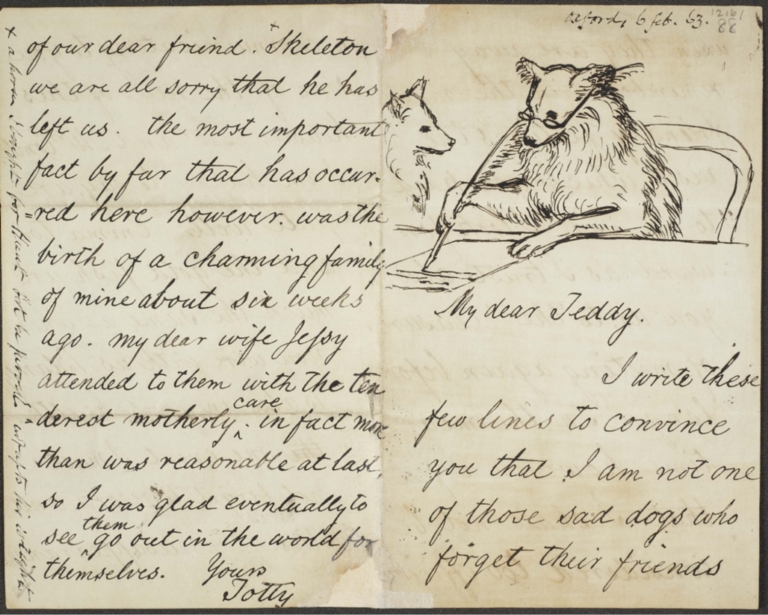
Project spotlight: Lives and Afterlives of Letters Network
Naomi Billingsley is a Leverhulme Early Career Fellow at The John Rylands Research Institute. In 2017, she and her colleagues set up the Lives and Afterlives of Letters Network using a JRRI Collaboration Grant. Here she talks about the network, its successes so far, and how the team plan to develop it into a larger research project.
Today marks World Post Day, coinciding with the anniversary of the Universal Postal Union (UPU), founded in Switzerland in 1874.
This is a fitting occasion to tell readers about the Lives and Afterlives of Letters Network, an on-going project at the JRRI that centres on letters and correspondence more broadly.
About eighteen months ago, five JRRI researchers (Florencempens, Katharina Keim, Alice Marples, Oscar Seip and me) got into conversation about letters. We realised that although our work spans different disciplines, time periods and languages, we all use letters in our research.
From there we applied for funding to support a programme of seminars and workshops to explore methods and best practice in research involving correspondence. We were very grateful to be awarded funding from both the JRRI (via a Collaboration Grant) and the School of Arts, Languages and Cultures (SALC) (via the Research Networking Fund). This funding supported a programme of three seminars and three workshops that Katharina, Alice, Oscar and I organised in 2017-18.
We heard about letters projects from a variety of speakers from Manchester and from other institutions in the UK and abroad. We were delighted that the programme was embraced by researchers from across SALC, curatorial and conservation colleagues at the John Rylands Library, and the wider university. A number of attendees also travelled from other institutions to attend events.
Such was the level of interest and engagement from our Manchester colleagues that we began to have conversations about establishing a long-term future for correspondence studies at Manchester. We are now working with Andrew Morrison (Classics, Ancient History and Archaeology) and Douglas Field (English and American Studies) to develop a centre for the study of correspondence at Manchester.
To further that aim, we have again secured funding from the School of Arts, Languages and Cultures and the JRRI. The funds will allow us to continue our programme of events in 2018-19, and administrative support for setting up the centre, which we plan to launch by the end of the academic year.
Andrew and Douglas will be the founding directors of the Centre. This year I’m acting as Programme Coordinator, Florence and Katharina are Programme Officers, Alice is Events Officer, and Oscar as Web Officer,
The programme will include a series of monthly seminars, beginning in November, three workshops focusing on Digital Humanities methods in correspondence research, and a launch event for the centre. We will be announcing details of the first events soon.
We are also contributing to the ArtsMethods training programme for postgraduate researchers. I ran an introductory session to using letters as sources last week, and on 22 October Oscar is running a session on ‘Network analysis and visualisation in historical research’ (details and booking via the Humanities Training Hub).
The study of correspondence is a touchstone that unites researchers across academic disciplines: relevant research areas include historical studies in various subject areas, as well as linguistic and corpus analysis in language studies. Ultimately, the centre will act as a hub for correspondence projects across the University of Manchester, and foster links with external partners and projects.
The centre will maintain strong links with the JRRI; the rich collections of correspondence at the John Rylands Library are one of Manchester’s strengths in the study of that medium. Collections range from ancient cuneiform tablets and papyri, to contemporary email archives; from small collections of little-known figures such as the 32 letters of the artist William Artaud, to large collections of well-known individuals and organisations such as the Guardian Archive.
Within the JRRI there are some new projects using correspondence at the John Rylands Library that we are looking forward to connecting with this year: Luke Uglow (Art History) has been busy over the summer working on the John Ruskin Papers for a JRRI-funded Pilot Project with Colin Trodd (Art History); Steve Parker (German) and Matthew Jeffries (German) have a new project centring on the Heinrich Simon papers; our own Douglas Field has a JRRI-funded Pilot Project on the Dave Cunliffe Archive.
You can find out more about our activities and sign up to receive details of our future events via the Lives of Letters blog and Twitter feed.
We look forward to seeing you online or at one of our events this year. In the meantime, Happy World Post Day!





0 Comments